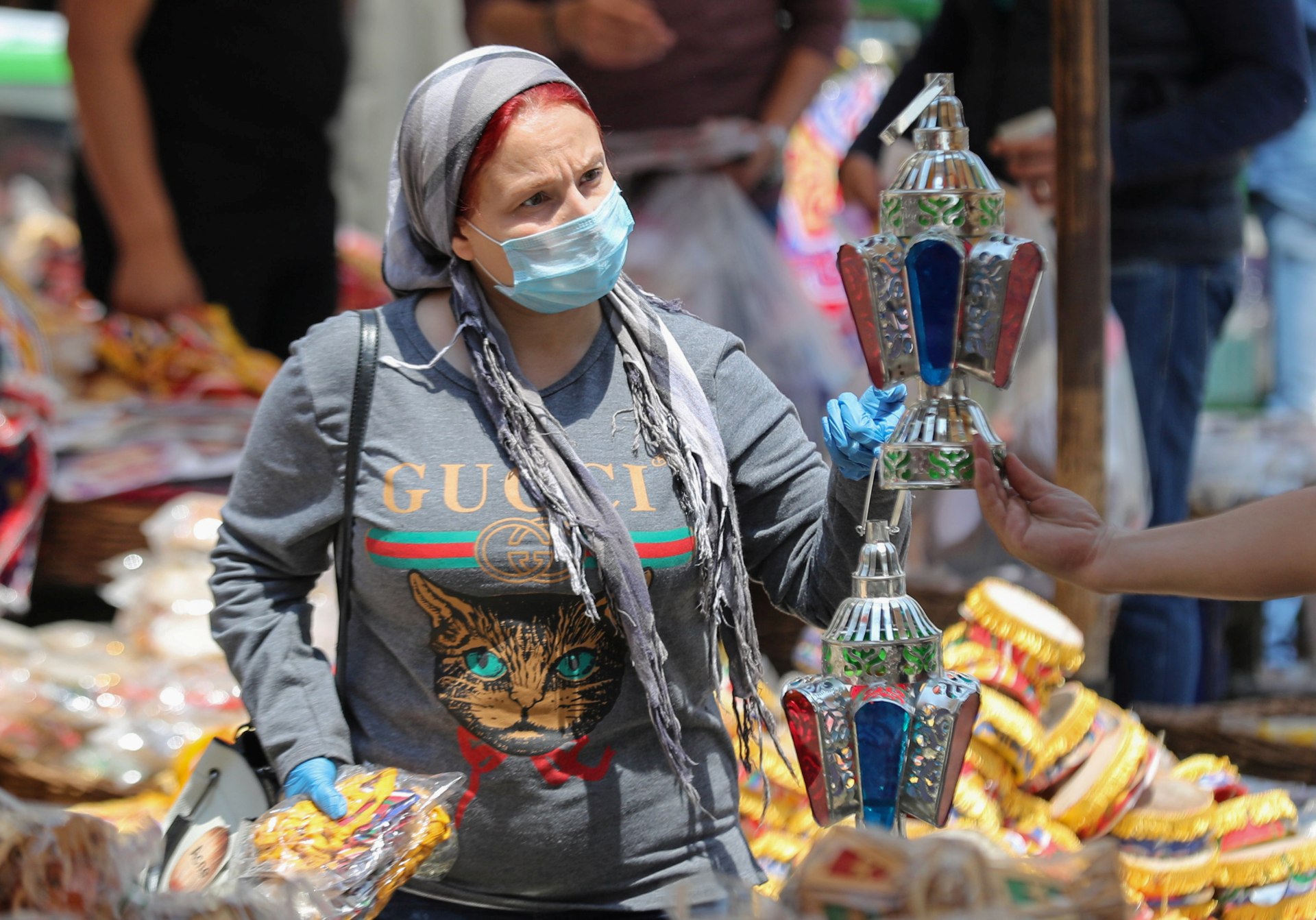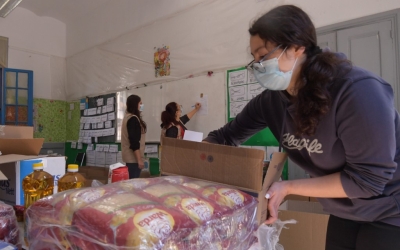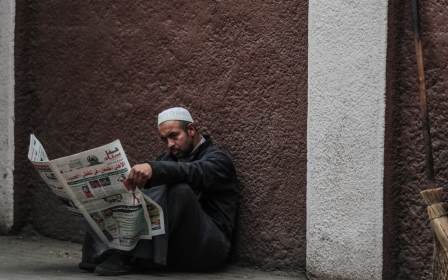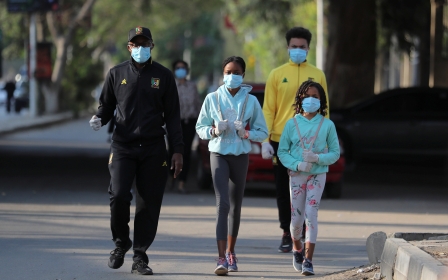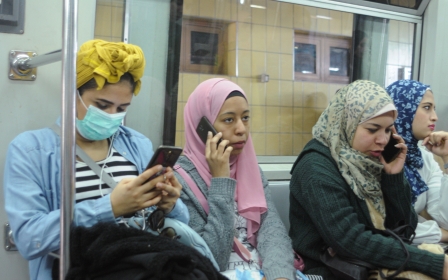'Staying home is for the rich': Social distancing is a luxury Egypt's poor can't afford
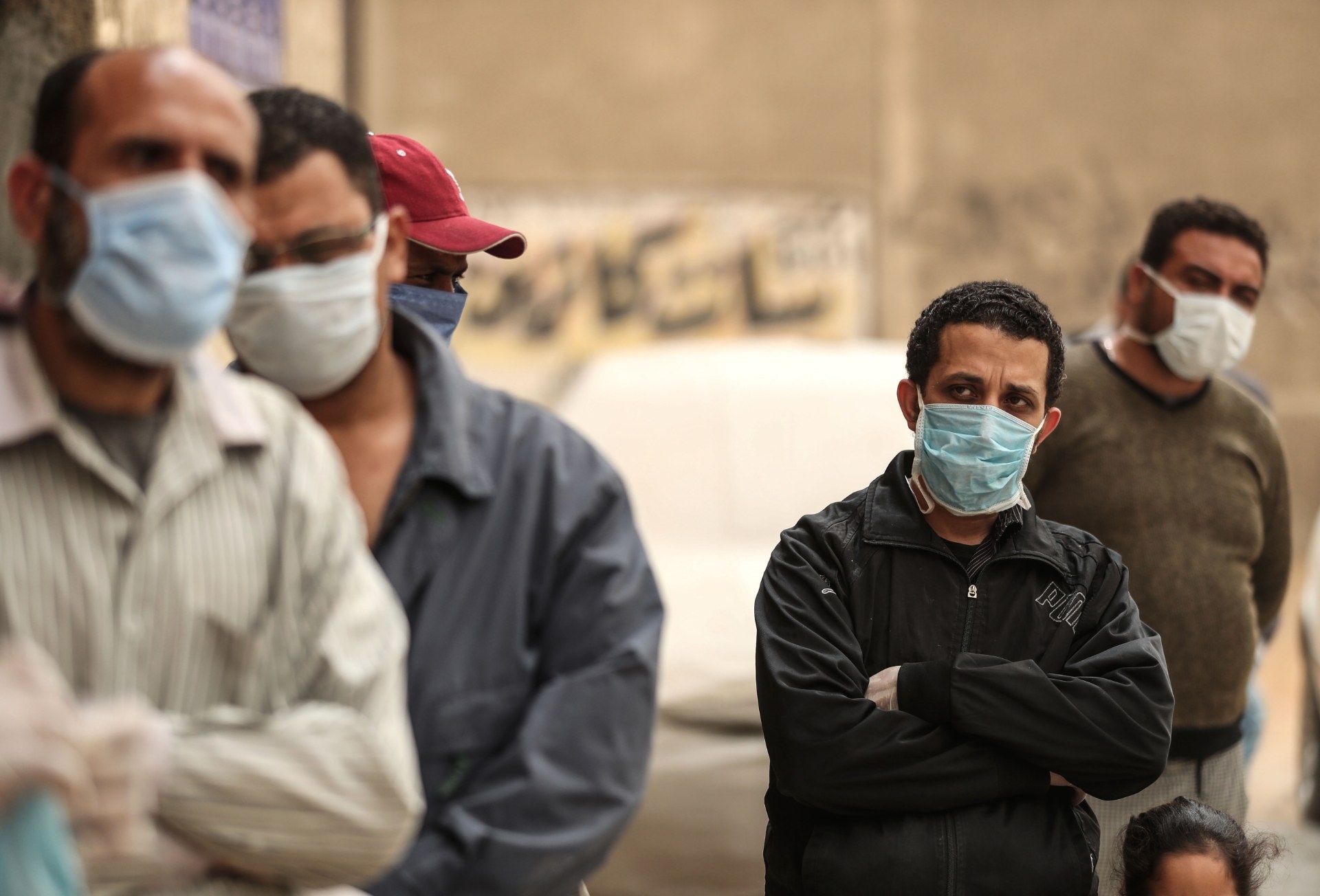
As a vegetable street vendor who travels some 90 kilometres from Monufia to Cairo every day, in the back of a crowded truck with 15 others, Samira Outt, 46, has been flouting the coronavirus social-distancing guidelines that demand people stay home as much as possible.
Like other millions of Egyptians, for Outt, a widowed mother with four children, staying home is not an option. If she did, the breadwinner would be unable to provide food, clothes and shelter for her family.
'If I catch the virus, I will die and if I don't work me and my children will die also, but of hunger. So it is the same'
- Samira Outt, street vendor
Responding to the coronavirus outbreak last month, the Egyptian government has imposed a nationwide nighttime curfew, and closed schools, universities, cafes, nightclubs and entertainment venues. It has also banned the movement of individuals, including using public transportation and private vehicles, on all public roads from 8pm to 6am every day.
Egypt was not always so stringent in its response to Covid-19, largely dismissing the danger as a problem other countries were facing.
But later, as the numbers of infections increased, the government started to lay the blame on citizens for the spread of the disease, while not providing the necessary means for social distancing and the minimum social security. Egypt has so far reported 2,505 coronavirus cases and 183 deaths.
New MEE newsletter: Jerusalem Dispatch
Sign up to get the latest insights and analysis on Israel-Palestine, alongside Turkey Unpacked and other MEE newsletters
Nevertheless, the restrictions have caused economic hardship for millions of already poverty-stricken Egyptians, including those relying on informal labour, which constitutes 30 percent of the country’s manpower.
In the latest report on income and expenditure, published by the state-owned Central Agency for Public Mobilisation and Statistics (CAPMAS), the proportion of people below the poverty line (estimated at approximately 735.5 Egyptian pounds, or $46.6, monthly) increased from 27.8 percent of the total population in 2015 to 32.5 percent in 2017-18.
Meanwhile, the rate of hunger or extreme poverty has increased from 5.3 percent to 6.2 percent in the same period.
Outt sells her products mostly to random street customers and women who work for the agriculture ministry in Giza’s bustling Dokki district, where she displays her produce. “If I don’t come to Cairo for a single day, I will not be able to afford food and save for the rent and school fees,” she tells Middle East Eye.
Not wearing a facemask or gloves, Outt mingles with 120 different people according to her estimates, including her customers. “If I catch the virus, I will die and if I don't work me and my children will die also, but of hunger. So it is the same,” she says.
Outt says in the villages of Monufia, a Nile Delta governorate northwest of Cairo, “there is no such thing as a curfew. Workshops, factories, construction sites and other workplaces continue to work so as to afford the losses due to the decrease in sales”.
On the days where she cannot come to Cairo to sell her produce, she works as a house cleaner to make up for the shortfall.
Another vendor in the working-class area of Ain Shams, Zien Awad, tells MEE that he has not heard or seen campaigns on how to deal with the virus, and doesn’t have access to the internet or a TV. The 56-year-old was only advised by friends not to smoke shisha.
Taking refuge from the burning sun under a leafy tree, Awad waits for customers to approach and buy honey and pies. “Staying home is for the rich, I will never be able to afford this,” he says of the lockdown measures.
Pointing at other street vendors and another line of people waiting at a governmental institution, Awad says: “If it hadn’t been for poverty and hunger, these people would have stayed home in peace.”
In Cairo’s Nasr City, dozens of construction workers, mostly from impoverished Upper Egypt, sit with their tools. One of them is Ashraf, 36, from Sohag. He lives in a horse stable with another 20 people, most of them builders, vendors, homeless or cleaners.
“I wake up around 4am every day, and go to the place [Nasr City], where a contractor or a homeowner can come to us and ask us to do a job or build something,” he says.
“I used to think that health is my only asset, but now I am okay to give it up in order to eat and provide for my family,” he says, adding he hasn’t been able to find employment for at least two weeks.
“A lot of people I know [who used to work in construction] went as far as collecting garbage and selling it, while others started to beg in the streets,” says Ashraf. “I don’t have money to send to my mother and father, let alone buy a mask and sanitiser.”
The Egyptian government has promised some support to those out of pocket, saying it will distribute 500 pounds (around $33) to workers from 13 April if they register before 9 April. The aid will be distributed in post offices around the country, it said, as well as branches of the state-affiliated Agricultural Bank of Egypt.
Middle East Eye attempted to contact Ashraf to see if he had applied for the aid, but friends of his claimed he had been arrested while coming back from a job for breaking the curfew, and has not been seen again.
State aid
In Giza’s Kerdasa village, Ahmed Abdallah, a doorman who works at a private residence, said he applied for the aid, but he had to pay a bribe of 100 pounds to the government employee to help him enter his data on the computer.
Middle East Eye contacted two other individuals who applied for aid, and both confirmed that they had to bribe either the post office security guard or employee to help them enter their data.
“Most of these people do not know how to read or write properly. How can they use a computer with the internet?” Abdallah said.
Among the forgotten individuals who cannot afford to practice social distancing, and are known to live in harsh and unbearable conditions, are security forces conscripts.
A police conscript from Assiut, serving in Suez’s security directorate, tells MEE that his senior officers gave him and everyone in his squad one facemask and a pair of gloves each, and said that they will have to keep them for 40 days.
As an alternative, he and his friends have had to use scarves and tissues to cover their faces when off-duty, and even made masks with cardboard and plastic.
The conscript, who requested to remain anonymous, said officers told them to keep their hands clean and “to handle this virus as if it is a cold”.
'There are around 300-500 people in every building, and they go in and out. Imagine if only one is infected'
- Military doctor
However, he noted that he and 39 others sleep in close proximity in one room in bunk beds, and they are not capable of washing their hands because most of their service entails them standing guard at a certain place for six or eight hours at a time, usually without running water.
“We used to use the bathroom in the nearest mosque, hospital or local cafe, but all these now are closed,” he says.
“I really can't say no or ask why. This is the army [military service]. You are doing as you are told.”
Another conscript in the Giza security directorate, who works as a driver for a high-ranking police officer, says that he and eight of his colleagues are staying in one small room, with no possibility of social distancing as all of them need some sleep before going on duty the next day.
The driver says only he and another colleague had so far received gloves and a mask, as they interact directly with high-ranking officers.
“The rest of the kids didn’t get anything. We have to feed ourselves from our own salary, so we don’t expect them to give us this protective equipment,” he says.
In the military, several cases have been reported, including two deaths. A military conscript, who is working as a doctor in a Giza training camp, tells MEE that “well-off conscripts can afford to buy masks and disinfectants, but others cannot”.
He adds that overcrowded facilities is the biggest problem the military might face, as well as the lack of training, to deal with handling a crisis such as a pandemic.
“There are around 300-500 people in every building, and they go in and out. Imagine if only one is infected,” he says.
Threats and repercussions
Even Egyptians with more stable jobs and public employees face the dilemma of choosing between obeying management's orders or facing possible sacking.
Amid a rise of nationalist and sentimental statements from Egyptian businessmen about the need to continue production and “open up the economy”, several factory workers and other employees assert that they have been forced to work either overtime with no extra pay, or have been threatened with being sacked if they do not come to work.
Three workers in a cement factory in Ramadan City have told MEE that their managers threatened to deduct from their wages if they did not turn up.
One of the workers said that the management promised the workers a “250 pounds corona bonus” but didn’t hand it out, and instead issued a decree that there will be salary cuts.
Mohamed Salem, a socialist activist from Mahallah, tells MEE that he fears the government will rally with the factory owners in using Article 7 of the Protest Law, which could see violators fined or imprisoned.
However, Maysa Atwa, member of the Egyptian parliament's manpower committee, says she and her colleagues are demanding businessmen support the state in its fight against the virus, and “show solidarity and support the workers”.
She told MEE that parliament demanded that not a single worker gets laid off and that workers should be given the needed equipment to keep themselves safe from being infected.
Middle East Eye delivers independent and unrivalled coverage and analysis of the Middle East, North Africa and beyond. To learn more about republishing this content and the associated fees, please fill out this form. More about MEE can be found here.


